Our Mission
The Fair Fight Initiative exposes systems of racial injustice in America and works to end systemic racism.
The Fair Fight Initiative has put together a simple informative guide about systemic racism. While intended to be a good basis of knowledge, this guide is in no way finished as systemic racism is an evolving topic of conversation and study.
The term “People of the Global Majority and Indigenous People” (abbreviated as POGMAIP) is used frequently throughout this guide. This is an inclusive and empowering term to describe people who are not white. Across the globe, the majority of people are not white and this term allows us to easily describe this reality.
Racism is difficult to define because people don’t want to talk about it. Systemic racism can go unnoticed by white people because they’re not looking for it. But the reality is that white people have benefited from systemic racism. If we are to move forward to a more inclusive and just society, we must work to understand and recognize the racism that POGMAIP faces every day and the enormous unwarranted benefits of white privilege.
Human beings have basic needs that need to be met to survive and to find happiness. Access to food, water, and shelter are obvious needs. But there are deeper needs that each of us has. The need to be loved and to love others, the need to be respected and the need to feel fulfillment in the life that you are living are all valid parts of the human experience.
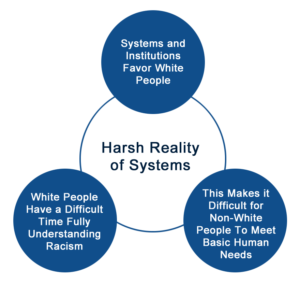 The harsh reality is that the systems that are in place in our society to help people meet these needs are biased against POGMAIP. These systems favor white people and make it more difficult for non-white people to have access to the things that everyone needs.
The harsh reality is that the systems that are in place in our society to help people meet these needs are biased against POGMAIP. These systems favor white people and make it more difficult for non-white people to have access to the things that everyone needs.
Talking about racism is not an attempt to guilt or shame anyone. It is about spreading awareness so that it can be properly addressed. Evoking change is a long process but learning more about systemic racism is an important first step.
Racism is the belief that one race is superior to another. This is built on the belief that people who are “different” are somehow inferior to one particular group. A person is a victim of racism when they are oppressed, marginalized, or face inequalities because of their ethnicity, beliefs, ideals, or nationality.
Systemic means something that is a big part of social, economic, or political practice.
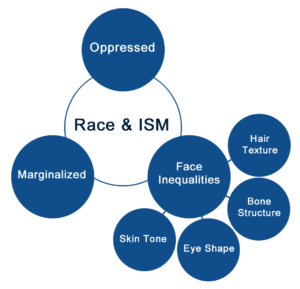 Race & ISM
Race & ISMRace is a group of people of common descent. Essentially, race is defined as the categories people are sorted into based on physical traits. This is most often skin tone, but it can also include eye shape, bone structure, and hair texture.
Racial groups can have wide genetic diversity within the boundaries of society’s definition. There are more genetic differences within a given race than there are genetic differences between races.
An “ism” is a distinctive practice, a system, or a philosophy.
Learning about the history of racism is an important part of understanding it. The Smithsonian National Museum of African American History & Culture has created a guide that talks about the history of racism in America. This guide will help you improve your understanding of the subject and provide context for the material below.
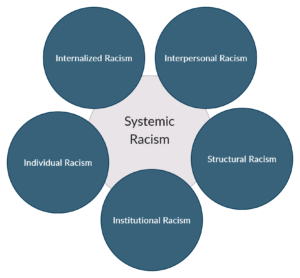
Racism can take many forms.
All of these forms of racism are harmful, but it is important to examine institutional and structural racism more closely as they are often overlooked. Systemic racism is not a single law or rule but instead is the racism that is embedded in society.
Systemic racism unfairly elevates white people over everyone else. It influences how POGMAIP are treated by the justice system but it can also affect housing, education, health care, hiring processes, and many other things in their lives. Systemic racism is not always obvious, although it certainly can be. The Jim Crow laws were one of the most obvious examples. Systemic racism can even be unconscious and it helps create inequality.
Systemic racism must be called out and addressed. There are several examples below of places that its effects can be seen.
Systemic racism can prevent POGMAIP from long-term employment and career opportunities. In an NPR interview, Richard F. America Jr., a well-known economist, and professor states that “Slavery, segregation, and discrimination were mechanisms for stealing money. Racism is primarily about making money. Taking money by force, by fraud, and by many other kinds of manipulation that enrich whites as a class at the expense of Blacks as a class.”
White Americans still control over 85% of the country’s wealth. Black Americans possess just over 4% and Latinos only possess 3%. White families on average possess ten times more wealth than a Black family. The wealth gap is made much worse by racist hiring practices, many of which automatically show a preference for white candidates.
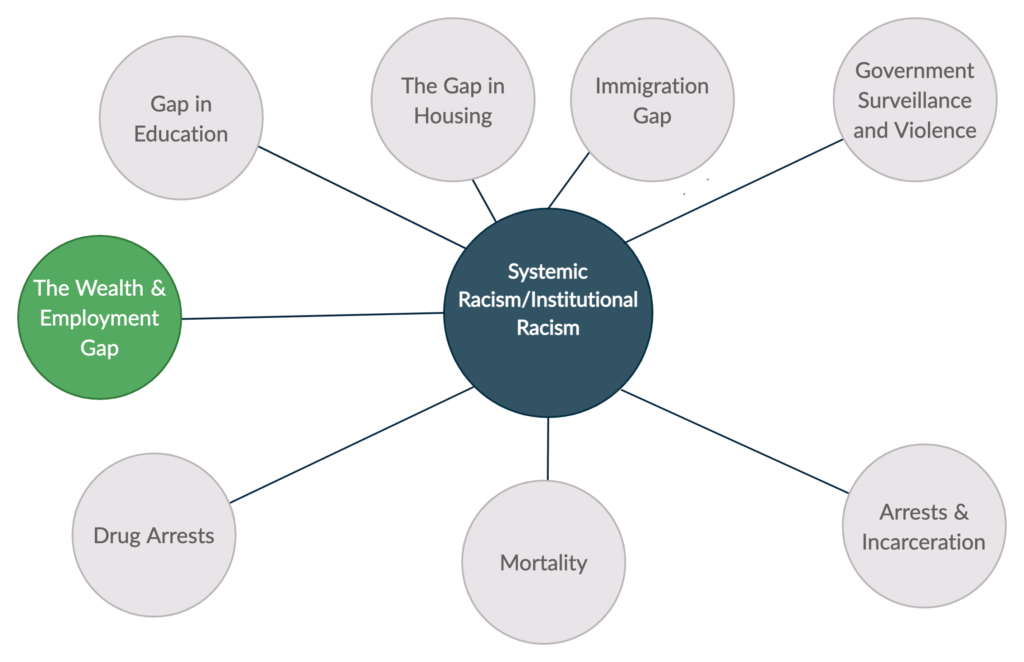
Systemic racism has a major effect on the educational system in the United States. A Black student is far more likely to be suspended from school than a white peer. This stretches from preschool through the end of high school. Black students are three times as likely to face serious disciplinary action when compared to a white student who committed a similar infraction.
Furthermore, Black students are far more likely to be held back by disabilities in their classes. 36% of students with disabilities who are held back are Black, a ridiculously high figure. Schools are far more likely to refer Black students to law enforcement than they are with white students. Generally speaking, Black students are frequently targeted by the educational system and face punishments that bar them from receiving crucial academic help.
Black unemployment is usually twice as high as white unemployment. This goes for people with a wide range of educational levels, as even Black Americans with college degrees struggle to get hired. Studies have shown that having a Black sounding name makes it 50% less likely that you will get a call back for a job interview when compared to a white-sounding name. POGMAIP are prevented from entering the workforce even when they are qualified for the job.
Housing is another industry in which systemic racism unfairly affects Black people. The history of the United States is replete with explicitly racist policies that kept Black Americans from decent housing. One common American practice is to build generational wealth through homeownership, yet only 42% of Black Americans own homes, whereas 72% of white Americans own their homes.
America is often referred to as a nation of Immigrants. White immigrants from Europe have largely been fit into American culture without too much trouble, while POGMAIP immigrants have not always been welcomed with open arms and equality. Instead, they are viewed as different or in some cases less than. Many of these immigrants are viewed as a source of cheap labor. Immigrants to this day struggle to find decent employment, a struggle that greatly impacts POGMAIP who enter this country.
Racism impacts mental and physical health. Race can also make it more difficult to obtain healthcare.
When compared to white people, according to the US Department of Health and Human Services (HHS):
POGMAIP also has to deal with the strain on mental health that racism creates, which can result in depression, anxiety, and high levels of stress.
Zip codes that are mostly populated by Black people who have less access to health insurance and fewer physicians in the community. And when a POGMAIP does get access to a health care provider, physicians may discriminate against that patient in some way, whether that be in poorly administering treatment or ignoring what the patient says altogether.
Health insurance also heavily favors rich white citizens. Black adults are more than twice as likely to not have access to health insurance compared to white adults. And the average Latinx adult is three times more likely to not have health insurance than a white adult.
The United States government has a history of illegally and secretly following Black people who advocated for civil rights. This includes influential figures such as Dr. Martin Luther King Jr. and Malcolm X. Police supported mob violence against innocent Black people was common in the aftermath of the Civil War and through the civil rights era. In several cities, police responses to Black self-determination movements resulted in police use of force killing Black activists.
The so-called “war on drugs” has uniquely been an attack on Black Americans.
Almost 80% of people in America’s prisons on drug-related charges are Black or Latino. Prosecutors are twice as likely to ask the court to give mandatory prison sentences if the defendant is Black.
The life expectancy of Black men and women is lower than the life expectancy of white Americans. Because of the lack of high-quality options, Black babies die at a staggering rate, almost 2.5 times more often than white babies. Black women die three times more often than white women in childbirth.
We live in a world in which a person’s race and zip code are the biggest determining factor in their life expectancy. That is morally unacceptable.
This systemic racism has contaminated every step of the legal process. Black people are jailed at a much higher rate than their white counterparts. A Black person has a much higher chance of being arrested, of being convicted, and of receiving a serious prison sentence for any given crime.
One clear example of systemic racism is the difference between the sentencing for possession of Cocaine and Possession of Crack. From a chemical standpoint, there is no difference between powder cocaine and crack. Possession of cocaine leads to a much lighter prison sentence compared to the penalties for possession of crack. Cocaine was strongly associated with white people, while crack was more common in Black communities. The difference between the two is a prime example of the ways that systemic racism creeps into laws and causes harm to Black Americans specifically.
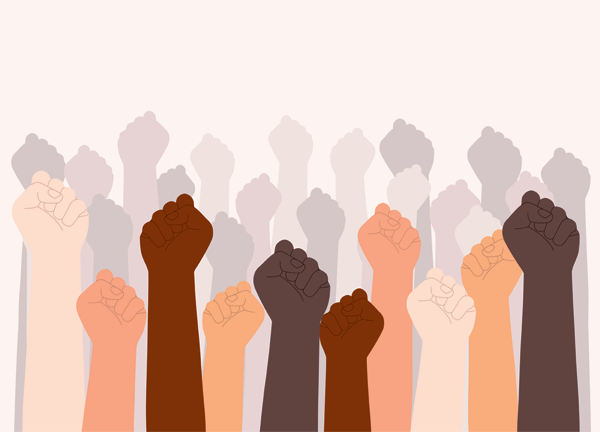 The Long-Term Effects of Systemic Racism
The Long-Term Effects of Systemic RacismThe burden of racism lies on the shoulders of POGMAIP. Dealing with prejudice daily has been proven to lead to disease. Furthermore, numerous mental illnesses can develop or worsen because of this constant racism.
The FFI relies on financial support from the public to continue this fight. From exposing biased judges to shining a light on the terrible conditions of the prisons in America to speaking out against police brutality, the Fair Fight Initiative is working to even the playing field for all people.
Because of the barriers that have been created, many People of the Global Majority and Indigenous People do not have the money or resources to get high-quality legal help. At the FFI, we provide these people with the vital resources they need.
We ask everyone to think about donating to the Fair Fight Initiative. Your gift will be used to allow us to continue our fight against systemic racism.
Featured in The Media




